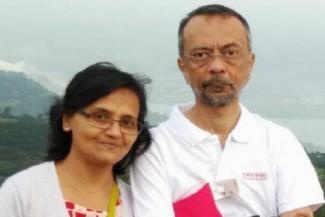
Jayesh Shah and his wife enthusiastically turned vegan with the hope of bringing down their cholesterol and diabetes levels. So why did they need to stop the diet? Read their experience.
In the month of October 2016, my wife and I attended a Wellness programme conducted by a “Health and Wellness Coach”. Both of us are 50+ and are suffering from High Cholesterol levels and Diabetes respectively. The promise of the programme was that these would be brought to normal levels without medication, only through nutritious eating habits.
We Turn Vegan
The basic premise of the programme was that whole food, plant-based diet led to disease prevention and reversal of common lifestyle diseases. Having heard the experts out and listening to some real-life experiences, we decided that there is no harm in trying it out, which meant that we turned ‘Vegan’. We immediately stopped consumption of milk/dairy products. We were also asked to cook without oil/butter or if absolutely essential, just a drop or two of it. I went off egg whites, too. I used to eat eggs without yolk earler.
A Typical Vegan Day
A typical day would look like this:
- A juice made of greens & a fruit, first thing in the morning on waking-up – around 6:45 am
- Breakfast consisted of 2 whole grain rotis along with soup (on most days, tomato, on some days cucumber) and 3-4 slices of fruit – between 7:30 & 8:00 am
- Since I have diabetes and have to eat something at regular intervals, I would have a few almonds and/or walnuts
- Lunch would be around 12:45 pm consisting of 4 rotis, vegetables and salad
- At around 3:30/4, I would have 3-4 slices of fruit
- While leaving office, if hungry I would have 3 spoons of a multi nutrient (GlucernaSR for Diabetics) with water
- Green/Black tea on reaching home if time permitted
- Dinner at 9 pm consisting of 4 rotis, vegetables and yellow dal
The immediate positive effect of this was we started feeling lighter and more energetic. I am not sure if it was psychological. However, we did miss out on proteins in our meals and other nutrients that we used to get out of mainly eating curd, paneer, egg whites, etc. Over a period of about 6 months that we continued with this diet, we both lost 4-6 kgs of weight, which in our case was an unwelcome byproduct since we were underweight in any case. We also did not see the promised control of either diabetes in my case, and high cholesterol in my wife’s.
We do not think there were any negatives in this experiment, except for the earlier stated point that we both lost weight. I also lost muscle mass. We also did not realise that our protein intake had gone down substantially and we did not substitute it though it was recommended that we increase our intake of lentils and sprouts.
How to Increase Vegetarian Protein in our Diet
Being vegetarians, we did not feel we were missing anything in particular by following this diet. However for my wife & our cook - the challenge was this was a very different style of cooking.
We Switch Back to Vegetarianism
Under the circumstances, after trying vegan diet out for 6 months, we have switched back to our original vegetarian diet. While not saying that veganism won’t work for anyone, we would like to point out that whosoever wants to try it needs to keep in mind that they will have to find substitutes for proteins and vitamins like B12, etc. Also do not forget to consult your doctor before embarking on this journey, a mistake that we made.
While we are off the programme now, I have continued to avoid egg whites and the occasional dish of chicken or fish that I used to consume at a restaurant. Also, we continue to cook in very little oil.
From my experience, I would definitely recommend it to people who are obese, diabetic, or have high cholesterol & hypertension problems, especially if they are finding it difficult (due to lack of discipline) to control their diet and do not work out regularly. Though it didn’t help us, there are friends who swear that they have seen improvements in their condition.
I would not term vegan diet extreme by any standards; and am not sure why it is not being prescribed more often by doctors. I think there is lack of awareness of the benefits that a vegan diet brings. However, things are changing and I find more people interested and aware.
People would need to understand that some of the stuff they will eat will taste different; especially rotis without ghee/butter, vegetables without oil. If you are used to having chicken or fish everyday, it becomes even more difficult. Not having milk in tea, curd based preparations, paneer/cheese is not easy. Some may just give-up at this thought, so better to be aware upfront.
If there are some specific situations/conditions in which it can help we will not hesitate to go back to a vegan diet. In fact, throughout our 6 month experiment, we continued with our work outs, we went out, and it was business as usual.
If one is determined, the diet is easy to follow; it is like any other regime, be it workouts, medical, etc. Discipline and determination are the keys to it.






